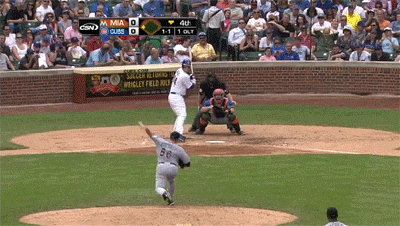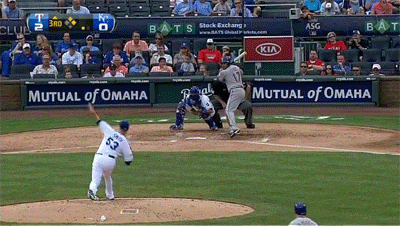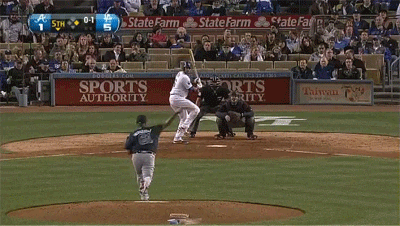Let's get a little silly. The Gold Gloves, Cy Youngs, MVPs, Managers of the Year, Hank Aaron Awards, and the Greg Spira Internet Baseball Awards (may Greg's memory remain eternally) have all been given out. It's time to appreciate the befuddling side of baseball. The awards that should be given out, but aren't.
Anyone can do something that makes you say "Wow!" It takes someone special to do something that makes you say "Why did you waste your time looking that up?" It's time for the 2012 Silly Awards, sponsored by Lobster Cola. (And if you get that reference, you win a billion points.)
Grounding Out for the Cycle
There are the players who hit for the cycle by getting a single, double, triple, and home run all in the same game. I once heard someone say that the hardest thing about hitting for the cycle is that you have to get four hits in the same game, and that doesn't happen all that often, much less that each of the four be a different type of hit.
My mind wandered to ask a different question. There are plenty of batters who go 0-for-4. Did any of them ground out for the cycle? That is, hit a ground ball to the third baseman, shortstop, second baseman, and first baseman all in the same game.
Turns out that the answer is yes. Depending how you want to define things, eight players hit ground balls on which an out was recorded to each of the four infield positions during a game, although some of them were fielders' choices. Because it's my award, I'm going to eliminate those fielder's choices from consideration. We're left with three winners on this one.
On April 24th, Jeff Francouer of the Royals grounded out to Indians first baseman Casey Kotchman in the second inning, to third baseman Jack Hannahan in the fourth, to shortstop Asdrubal Cabrera in the fifth, and to second baseman Jason Kipnis in the eighth. For good measure, he grounded into a 5-4 fielder's choice in the 9th.
On July 29th against the Nationals, the Brewers' Cesar Izturis grounded out to first baseman Adam LaRoche in the first inning, sacrificed (5-4) to Ryan Zimmerman in the sixth, grounded out to second baseman Steve Lombardozzi, Jr. in the seventh, and completed the quadrifecta of shame by grounding out to shortstop Danny Espinosa.
Finally, on August 20th, Colorado Rockie Charlie Blackmon hit grounders to Mets shortstop Ruben Tejada (first inning), "second baseman" Daniel Murphy (third), third baseman David Wright (sixth), and first baseman Ike Davis (eighth).
None of these men had the foresight to do something cool like go left to right or right to left in their grounders. I demand more baseball until this happens!
Double Play of the Year
My wife will tell you that when I say "Ok, on the count of three…" I finish it with "Six-Four-Three." I'm fascinated by double plays. I'm sure it says something about me psychologically, but I'm not sure that I want to go there. The double play of the year can't be a simple grounder to second, even if it involved a diving stop, unbelievable flip, barehand catch-jump-sorta-be-somewhere-near-second, and a great scoop at first. Boring! I'm looking for the most unlikely way to actually record two outs on the same play. Fortunately, 2012 obliged.
Third place: 7/19, Marlins at Cubs. The award for the most moving parts on a double play this year goes to the Miami Marlins of Florida, who recorded a 4-2-5-1-6-4 twin killing in the bottom of the fourth inning. With the Cubs' Reed Johnson on third and Anthony Rizzo facing now-former Marlin Mark Buehrle, the Marlins brought the infield in. Rizzo hit a ground ball directly at now-former Marlin Omar Infante who threw home to catcher and now-former Marlin John Buck, leaving Johnson hung up in a pickle. Buck threw to third baseman and now-former Marlin Hanley Ramirez who threw to Buehrle covering at home, who threw to… you guessed it… now-former Marlin Jose Reyes who applied the tag on Johnson. Rizzo, as often happens on these types of plays, tried to take second, but Reyes fired back to Infante at second to eliminate Rizzo. The play won the award for the most throws recorded in the service of a double play in 2012 (or as I like to think of it, the double play most resembling a phone number).
And oddly enough, four and a half months later, none of the five gentlemen involved plays for the Marlins. When I looked it up, the other players on the field at the time who didn't get in on the action were first baseman Carlos Lee (free agent), left fielder Austin Kearns (free agent), center fielder Emilio Bonafacio (traded), and right fielder Justin Ruggiano. Think of this as the play that broke up the Marlin dynasty.

Second place: 8/4, Rangers at Royals. The Royals managed to turn trash into treasure in the top of the third inning. With Josh Hamilton on second and Adrian Beltre on first, Nelson Cruz hit a chopper right at Royals shortstop Alcides Escobar, who forgot to catch the ball. After the ball clanged off his glove and ended up somewhere behind second base, Hamilton held at third. It's just that Beltre didn't get the memo until he was about halfway to third. Escobar had gone out to retrieve the ball and threw to second baseman Chris Getz, who tagged Beltre. Apparently figuring that since Beltre was a dead duck, Cruz decided that he would at least use the confusion to try for second. However, Getz's throw back to Escobar beat Cruz to the bag and the Royals had somehow pulled off an improbable E6, DP 6-4-6 to end the inning.

First place: 4/23, Braves at Dodgers. After Matt Kemp led off the bottom of the fifth with an infield single, Andre Ethier came to the plate to face Livan Hernandez. On the 1-1 pitch, Ethier blooped one over the infield and in front of left fielder Matt Diaz. Kemp had third easy, but decided that he was feeling frisky and tried to score. Diaz had already gotten the ball in to cutoff man Jack Wilson. Wilson saw Kemp charging home and threw to catcher Dave Ross, who tagged Kemp for the first out. Meanwhile, Ethier momentarily decided to try to take second on the throw home, then decided not to, then decided to try again, then realized that Ross was throwing down to Freddy Freeman and couldn't scramble back fast enough to become the back end of a 7-6-2-3 double play. Vin Scully told a story about how the Brooklyn Dodgers used to do things like that, because he's Vin Scully. In a year that had been so improbable, he wondered aloud how the Dodgers had somehow hit into a double play on consecutive singles.

More Double Play Awards
Two teams managed to record five different combinations of double plays in 2012:
Minnesota turned five different double plays against the Royals on July 21st (Casilla-Dozier-Parmelee, Carroll-Casilla-Parmelee, Dozier-Casilla-Parmelee, Casilla-Dozier, and Parmelee-Dozier). The first three were standard ground ball DPs while the last two were line out/double off types.
The Rays also turned five different double plays against the Indians five days earlier (Rhymes-Pena-Johnson, Keppinger-Rhymes, Rhymes-Pena, Molina-Rhymes, and Johnson-Rhymes-Keppinger). Notable in that game was that Indians third baseman Jose Lopez managed to be the batter in three of them, each of a different type. In the third inning, he lined out to third baseman Jeff Keppinger who threw to second baseman Will Rhymes to double off Jason Kipnis. In the fifth, he hit a ground ball to Rhymes, who stepped on the bag to eliminate Michael Brantley and threw to Carlos Pena for the twin killing. In the seventh, Lopez struck out on a 2-2 pitch whilst Kipnis was caught stealing.
The careful reader might note that the record for double plays turned by one team in a 2012 game was actually six, turned by the Red Sox against the Orioles during their May 6th game (the one where Darnell McDonald and Chris Davis ended up pitching against each other). However, there were only four combos of players who participated. The Orioles actually hit into double plays in the 12th, 13th, 14th and 15th innings, but they can still take some comfort. First off, they won the game, but as a team they also double played for the cycle, hitting into a 3-6-3, 4-6-3, 6-4-3, and 5-4-3 all within the same game. How did the game end? With the Orioles getting revenge and turning a 6-4-3 twin killing hit into by losing pitcher Darnell McDonald.
The Groundhog Day Award
In the bottom of the first inning of a July 5th tilt between the Cubs and Braves in Atlanta, Juan Francisco became the eighth man to bat in the inning against Matt Garza. Andrelton Simmons stood on first after working a nine-pitch, two-out walk off Garza. Francisco worked the count to 2-2 and Simmons took off for second, only to see Francisco foul the ball off. The next pitch was a ball, setting up a 3-2 count with two outs. Simmons, of course, was running with that pitch, but Francisco fouled it off again. Simmons went on the next pitch, but again Francisco fouled it off. Perhaps a little gassed, Simmons went back to first to try it again. Three more foul balls later, perhaps an unkind thought passed through his mind. What Simmons didn't know is that he would do this again, and again, and again, and yet again. In this one plate appearance, Simmons broke for second, only to be sent back a total of 10 times. No one else in 2012 had to endure more than six of these false starts in one plate appearance. Francisco ended the 16-pitch marathon (and the inning) by grounding out to first.
Oddly enough, over the rest of 2012, Andrelton Simmons had only two false starts. Who were the league leaders? In third place, Elvis Andrus had 18 false starts. In second place, Adam Jones did the groundhog dance 19 times. And in first place, with 21 times having to walk back to first, his valiant efforts wasted, was Mike Trout.
I rest my case.
Thank you for reading
This is a free article. If you enjoyed it, consider subscribing to Baseball Prospectus. Subscriptions support ongoing public baseball research and analysis in an increasingly proprietary environment.
Subscribe now
Apparently some other products mentioned in that game were "Popemobile Cabs" and "Chork".